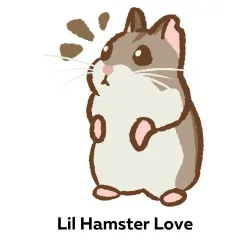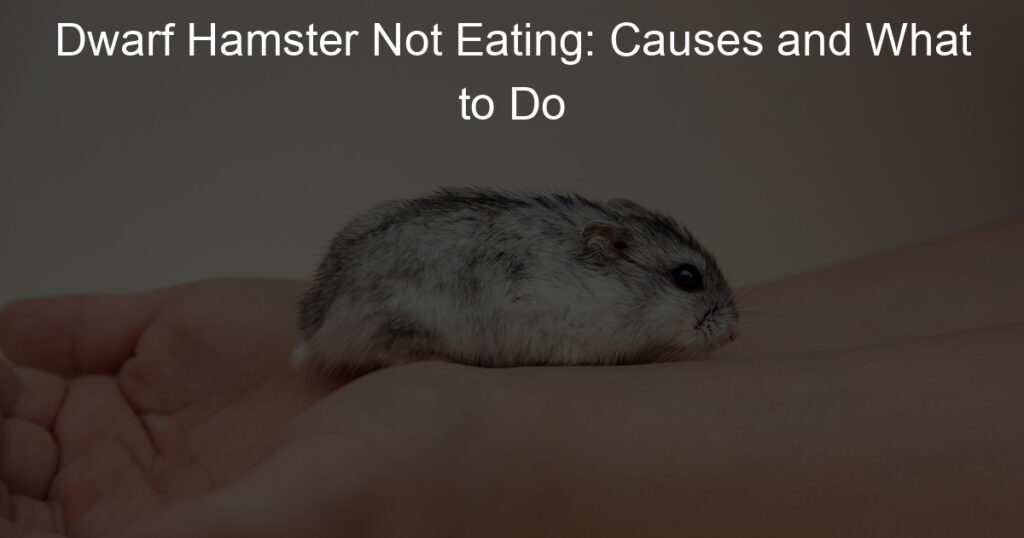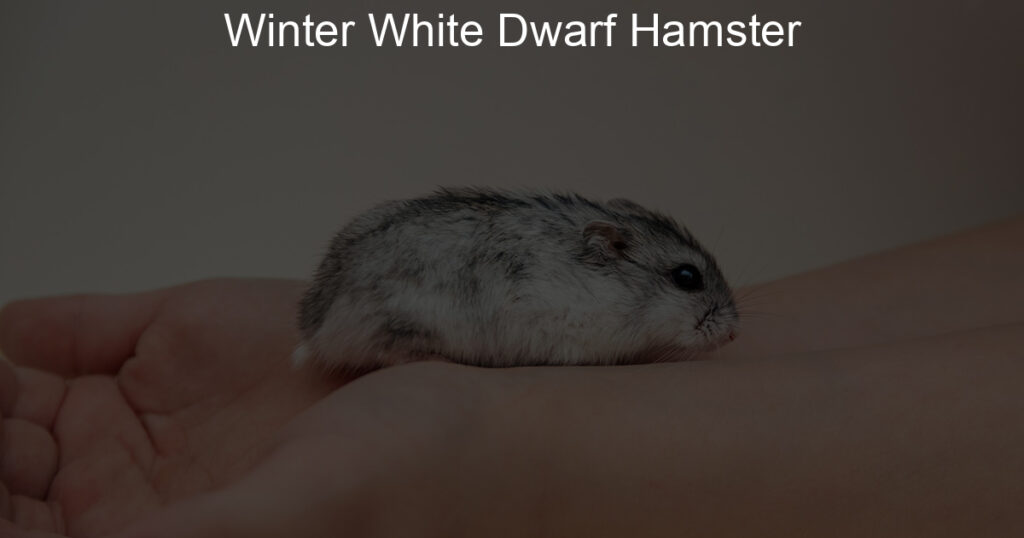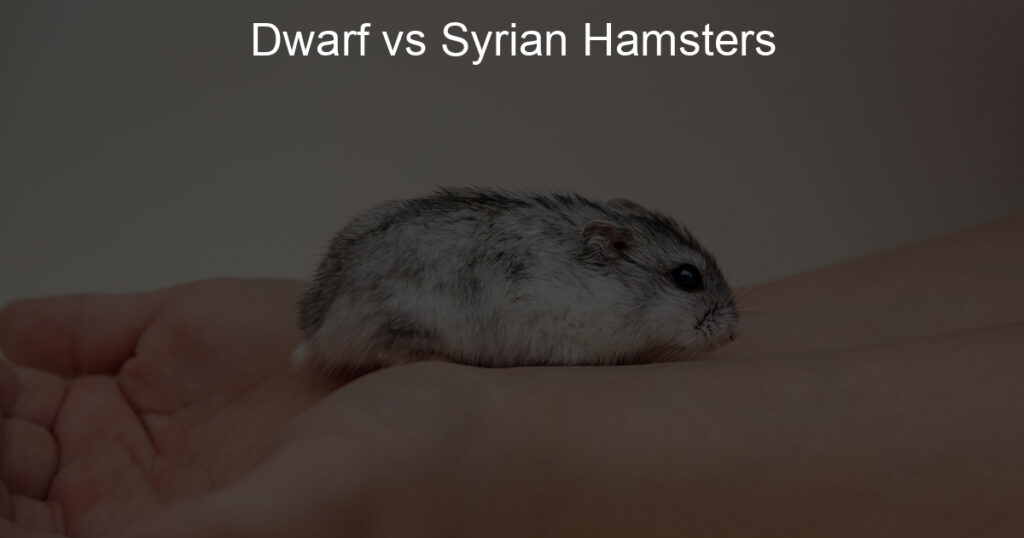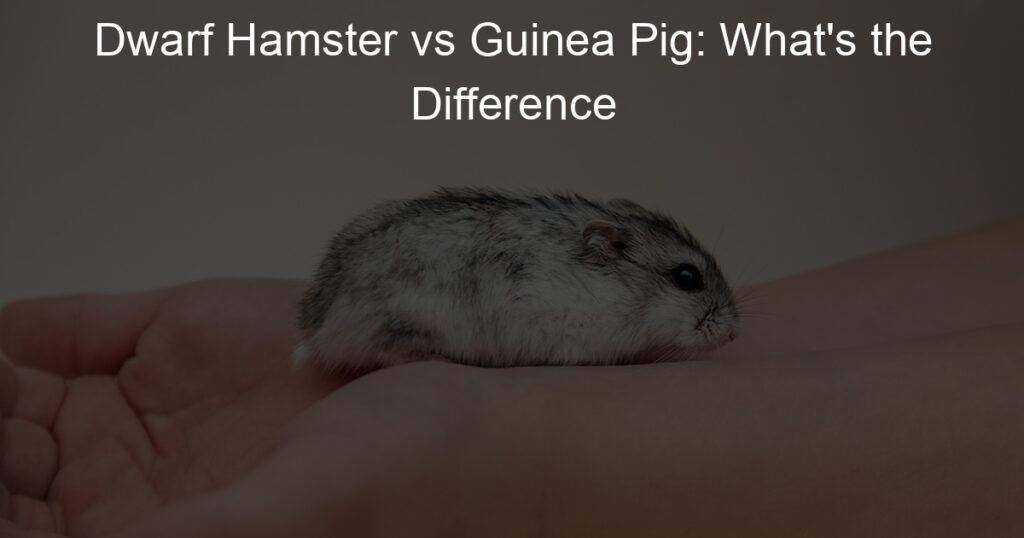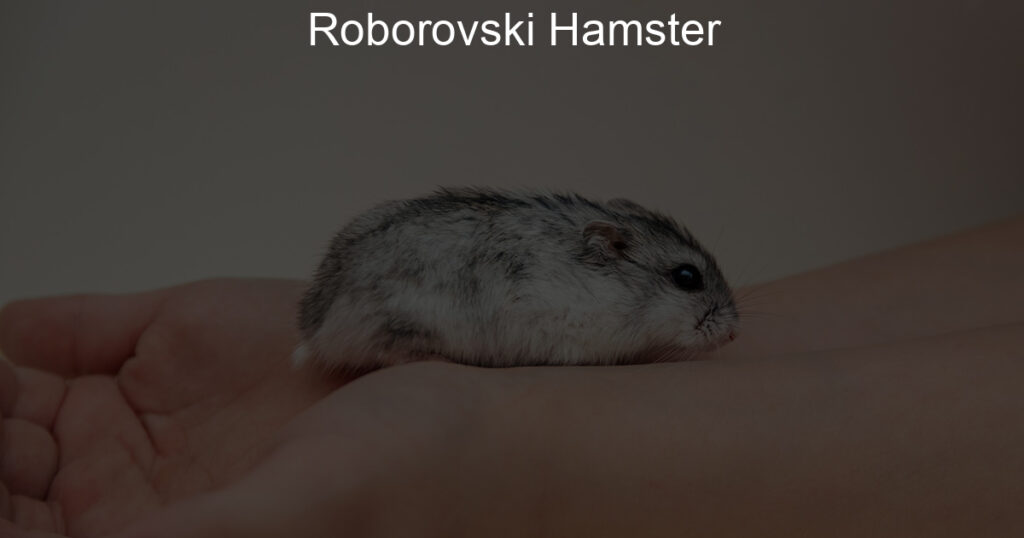It can be distressing to watch your beloved dwarf hamster not eating. It’s important to understand the causes and what you can do as a pet parent to help get them back on track.
In this blog post, we’ll explore different reasons why your little fuzz ball might suddenly stop eating, from dental problems to stressful environments, so that you have the information needed to assist your pet in getting back in the habit of having good nutrition.
Read on for some practical tips and advice about how best to approach this common yet serious health concern for our four-legged friends.
Why is my dwarf hamster not eating?
If your dwarf hamster isn’t eating, it may be a sign of illness or stress. It’s always important to make sure the food provided is fresh and of good quality, as stale food can turn off even the most enthusiastic eaters.
Also, be aware that if you recently moved your hamster’s cage location or added new inhabitants to their environment, they may be feeling overwhelmed and need some time to adjust. Make sure you provide plenty of hiding places and toys to help them feel more secure.
Additionally, if they are looking lethargic and just not acting like their usual selves, you may want to take them in for a check-up with your vet right away.
What should I do if my hamster is not eating?
If your hamster isn’t eating, it’s important to try to determine the cause. It might simply be that they don’t like their food, so consider changing their diet and offering them a variety of different fruits, vegetables, and more exciting food items such as cooked eggs.
Provide plenty of fresh hay for munching as well. Additionally, it may also indicate an underlying health issue; visit the veterinarian if you’re concerned about this possibility.
Finally, make sure that their cage is clean and that they have enough room to run around in; boredom or stress can also lead to appetite loss. With some simple adjustments and a few lifestyle changes, even the pickiest of eaters can get back on track.
Can hamsters be picky about food?
When it comes to hamsters, some may wonder if they can be picky with their food. The answer to this is generally yes, as many times hamsters are used to the same type or brand of food and will be hesitant to try something new.
This behavior of being “picky” is completely normal and should not discourage you when introducing your pet to options that include fresh foods and other treats.
While your hamster may show hesitation at first, with patience and understanding, they may eventually learn to accept that there are a variety of choices available when it comes to meals.
What should I do if my hamster is a picky eater?
If you’re finding that your hamster is turning its nose up at meals – don’t worry! Picky eating habits can be a common trait of hamsters, so you’re not alone. The first step to ensuring your furry friend stays healthy and happy is to make sure it has a variety of snacks and foods available every day.
Although they usually love fruits, vegetables, and grains, also experiment with some new treats like pumpkin seeds or Timothy hay for variety. It’s best to stick to small portions as well; because their stomachs are so tiny, and overfeeding can cause serious health issues.
Overall, the most important thing is that you keep an eye on your hamster so you know what it likes and doesn’t like when it comes to food. With these simple tips, even picky eaters can have a delicious and balanced diet!
How do I get my dwarf hamster to eat?
Dwarves hamsters can be surprisingly picky eaters. Still, they do need proper nutrition and there are steps you can take to help them want to eat more.
The best thing you can do is move around the types of food your dwarf hamster has to choose from, switching up seed mixes and adding fun treats like nuts or even fruit. Stick with healthy options, but try different flavors to see what their tastebuds like the most!
A regular feeding schedule can also help. If your hamster can get used to a routine, it will become more eager for mealtimes and may even come running when you arrive with new goodies!
How long can dwarf hamsters go without food?
Dwarf hamsters are known for being small and cute, but they’re surprisingly impressive when it comes to surviving without food. They can be without food for up to fifteen days during hibernation, relying mostly on their fat reserves while in torpor.
This also gives them an edge in the wild where food sources are often scarce or nonexistent. You don’t want your dwarf hamster going on a hunger strike at home – if you’re wondering how long your lil’ pet can go without food, try to stick around the three-to-five-day mark!
How do you keep a dwarf hamster healthy?
Taking good care of a dwarf hamster is important to help set them up for long, happy, and healthy lives. They should have the right-sized cage with solid floors that are lined with materials such as wood shavings or paper-based bedding to give them somewhere comfortable to nest.
The enclosure should be cleaned regularly and the bedding changed at least every week. Hamsters are active creatures and need plenty of chew toys, exercise wheels, tunnels, and hideaways in their cages for them to stay stimulated and active.
Chewing is a natural behavior for hamsters so acceptable items like unsalted nuts, straws, and pieces of fruit tree branches can be provided for them to chomp on! As far as food goes, there are balanced hamster diets available from pet stores that will provide your dwarf hamster with all the essential nutrients they need.
Supplementing this diet with additional fresh vegetables can help keep your furry friend even healthier!
How do I encourage my hamster to eat?
Proper nutrition is essential for keeping your hamster happy and healthy, so it’s important to make sure they eat. Thankfully, encouraging them to do so can be fairly straightforward.
For starters, always make sure fresh food and treats are available throughout the day and switch up their diet with variety by introducing new flavors or textures now and then. You could also use special treat balls that keep your pet active while searching for food or place food in different areas in the cage to encourage exploration.
Additionally, adding a moss ball to their enclosure will keep them busy and allow them to explore without you having to intervene as much. Finally, always serve your hamster’s meals around the same time each day – they’ll start recognizing when it’s mealtime which keeps them naturally engaged in eating!
What to do if the hamster doesn’t eat?
If your hamster isn’t eating, the first thing to do is to think about why this might be. If it’s their activity level, try giving them more things to play with or a larger space to move around in.
Making sure they have mental stimulation by changing their exercise wheel and introducing other forms of enrichment can also help. Monitor their water intake too – dehydration can lead to an unappetite for food, so make sure you replace it often and check that it’s fresh.
Keeping an eye on their body condition and weight is important, as well as examining if anything else might be causing discomfort. Finally, remember that worries over behavior changes should always involve consulting the vet.
Taking these necessary steps will ensure that your furry friend is safe and healthy!
Why do hamsters lose their appetite?
Hamsters are known for their natural curiosity and endless appetite, but sometimes they can lose their appetite. Many underlying causes could be at fault – stress due to a change in environment, illness, nutrient deficiencies or simply aging.
If it’s related to a change in environment, time is the best remedy; however, if this persists it might be worth checking in with your vet. With some patience and extra attention, you can help get your hamster’s appetite back on track.
What does a sick dwarf hamster look like?
When a dwarf hamster is sick, it may look listless, unkempt, and generally down. Their fur may be matted and dry, their eyes may be sunken and their nose may appear runny.
The key difference between a healthy dwarf hamster and a sick one is in their energy – when healthy, these small creatures are usually active throughout the night. If you notice that your pet spends a lot of time inactive or uninterested in food, it might be a sign of sickness and you should take them to the vet for a check-up.
As a result
It is essential to keep a close eye on your little dwarf hamster if it isn’t eating. There can be many potential causes of why your pet isn’t chowing down but some, like stress, injuries, or a temperature change are easier to identify than others.
You should first check the basics and see if their regular food has gone rancid or if the general environment around them has changed. Even though a vet will undoubtedly get to the root cause quickly, there are home remedies you can try that just might do the trick and make your little pal happy again.
Whatever troubles them, providing lots of love and enough to eat will ensure that they remain healthy and vital for a long time.
